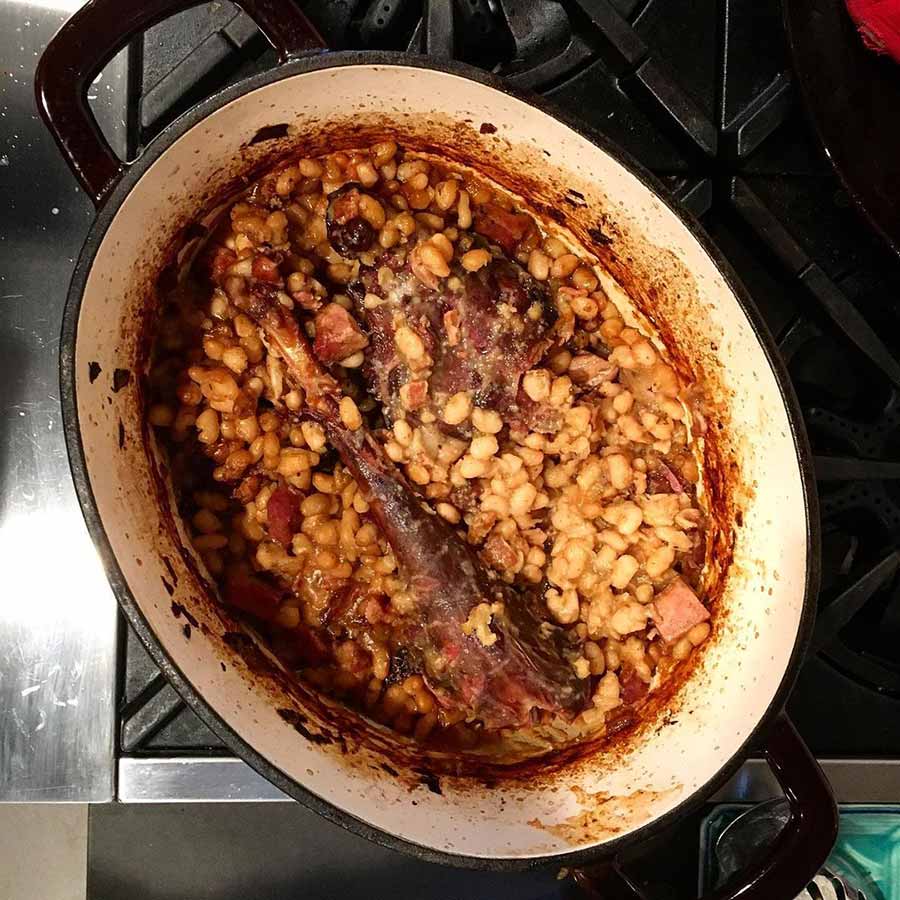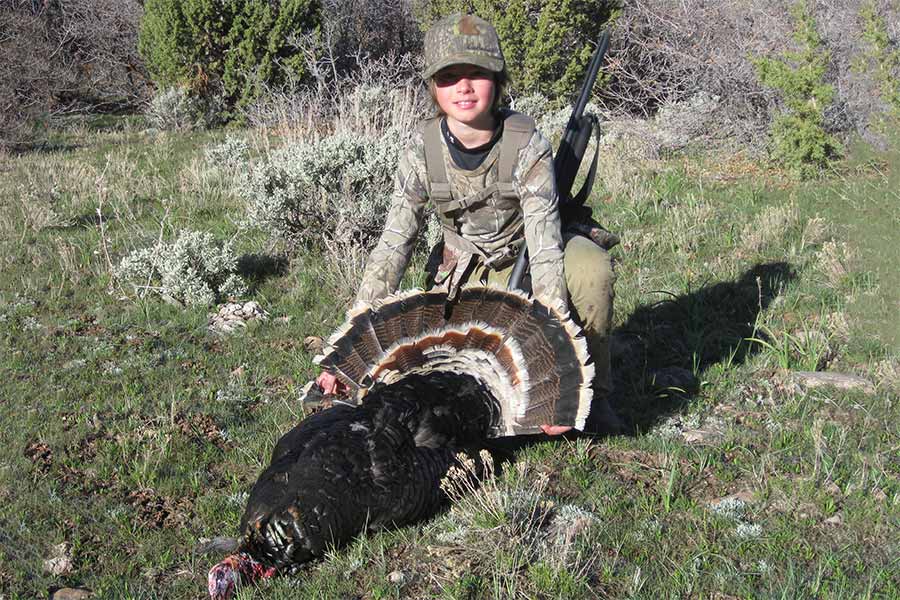Wild turkey cassoulet
This spin on a comforting French dish is the perfect way to use up those Thanksgiving leftovers.
By Darby Doyle
Technical Writer
DWR Conservation Outreach Section
It seems like we've always got a smoked wild turkey leg or two stashed in the deep freeze following a spring gobbler hunt or Thanksgiving dinner. After I serendipitously discovered that my oval Dutch oven perfectly cradles an entire bone-in turkey leg, wild turkey has become my go-to addition to the classic French comfort dish, cassoulet.
Beyond the basic building blocks of white beans and poultry or pork stock, cassoulet can be made with seared duck, goose, upland game birds and a variety of sausages.
The most traditional cassoulet recipes are made to feed a crowd of 8–10 people and include elaborate steps — such as making a decadent duck confit — which can take up to three days to complete. This smaller-quantity version cuts back on the lengthy method by including smoked wild turkey, but it's also great made with any turkey that has been deep fried or oven roasted.
Wild turkey cassoulet
Servings: 4–6
Plan for plenty of time to make cassoulet. The dried beans should soak for a few hours (or overnight) and you will need to check on the cassoulet about once an hour during its total 6-hour baking time.
Ingredients
- 1 pound dried small white beans (such as navy or great northern beans)
- 5–6 ounces pancetta or uncured bacon, diced
- 1 tablespoon olive oil
- 1 medium yellow onion, diced
- 2 carrots, diced
- 1 rib celery, diced
- 3 garlic cloves, minced
- 1 tablespoon tomato paste
- 2 andouillettes (or other spicy link sausage)
- 2 mildly-spiced fresh pork or game sausages (or other mild link sausage)
- 1 smoked wild turkey leg or thigh-leg quarter (thawed, if previously frozen)
- 1 quart (32 ounces) chicken or pork stock
- Fresh herbs: 2 sprigs parsley, 2 sprigs thyme, 1 small sprig rosemary
- 1 bay leaf
- ¼ teaspoon freshly grated nutmeg
- Salt and pepper
Directions
Step 1
Pick through the dried beans to remove stones or other debris. Place the beans in a large bowl or pot and add enough cool water to cover the beans by 2–3 inches. Soak the beans at room temperature for 3–4 hours (or overnight if you suspect they are over six months old).
Step 2
Preheat the oven to 350 degrees. Drain the beans and set aside.
Step 3
In a large enameled Dutch oven on the stovetop, add the pancetta and cook over medium heat until it is just starting to crisp up and is lightly browned on most sides. Remove pancetta with a slotted spoon to a small bowl and set aside.
Step 4
To the same Dutch oven, add the olive oil to any remaining pancetta fat. Add the onions, celery and carrot. Sauté the vegetables until the onions are just starting to get translucent.
Step 5
Reduce heat to medium-low and add the garlic; stir frequently for one minute to keep the garlic from scorching. Add the tomato paste and stir until all ingredients are combined, cooking for another 2–3 minutes.
Step 6
Push the vegetables to the outside edges of the Dutch oven. Turn the heat back up to medium and add the sausage links (whole) to the middle of the pot. Brown the sausages, turning them to brown on all sides. Pull the vegetables away from the sides of the pan and give a quick stir to evenly distribute the vegetables around the sausages.
Step 7
Turn off the stove burner and remove the Dutch oven from heat.
Assemble the cassoulet in layers: Add about ⅓ of the drained beans to the pot, evenly distributing the beans around the sausages. Place the entire turkey leg or thigh-leg quarter on top of the sausages and tuck the fresh herbs and bay leaf around the edges of the turkey. Add the remaining beans, covering the turkey as much as possible and creating an even top layer.
Step 8
Spoon the reserved pancetta evenly over the top of the beans. Slowly pour in the stock, adding just enough to barely cover the beans (use about 3 cups for this, and reserve the rest of the stock for later). Grate nutmeg onto the surface of the beans, and add a generous pinch each of salt and cracked black pepper sprinkled over the top.
Step 9
Bake, uncovered, at 350 degrees until the cassoulet comes to a simmer and a crust just begins to form on top — about one hour. Then, reduce the oven temperature to 250 degrees.
Step 10
After an hour baking at 250 degrees, a nice crust should be present on the beans. Break the crust with the back of a spoon to resubmerge all of the beans in liquid. If the beans are getting dry, add a bit more stock (or water) until they are just barely covered. Bake for another four hours or until the beans are very tender; check on the cassoulet hourly to re-break the crust and add more stock as needed. During the last hour of baking, do not disturb the crust.
Step 11
Remove the cassoulet from the oven and allow it to rest, uncovered, for 15 minutes. Gently break through the crust to cut the sausages in half (or thirds) and serve the cassoulet directly from the Dutch oven at the table.
Get inspired for the next spring turkey hunt with this fun video!









